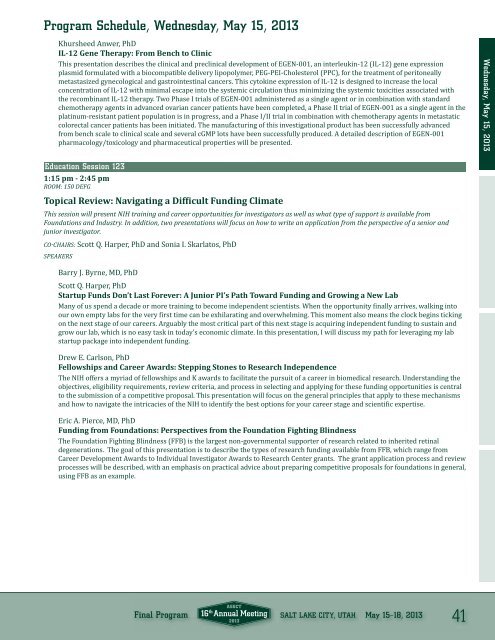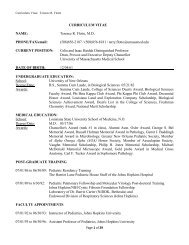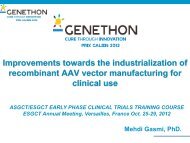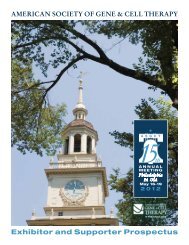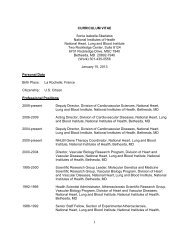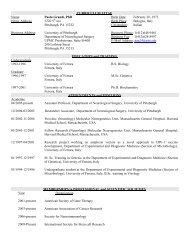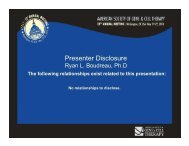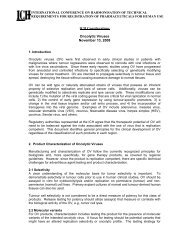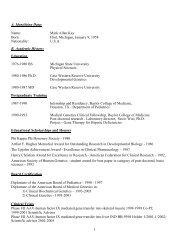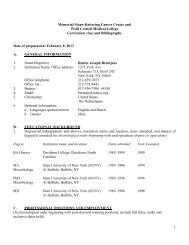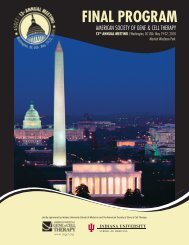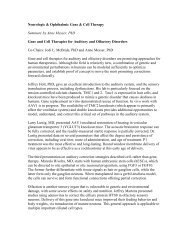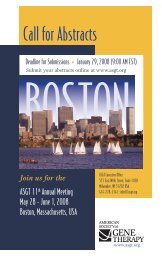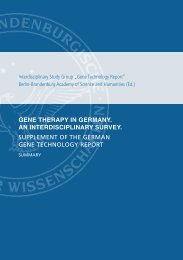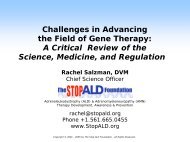Final Program - American Society of Gene & Cell Therapy
Final Program - American Society of Gene & Cell Therapy
Final Program - American Society of Gene & Cell Therapy
You also want an ePaper? Increase the reach of your titles
YUMPU automatically turns print PDFs into web optimized ePapers that Google loves.
<strong>Program</strong> Schedule, Wednesday, May 15, 2013<br />
Khursheed Anwer, PhD<br />
IL-12 <strong>Gene</strong> <strong>Therapy</strong>: From Bench to Clinic<br />
This presentation describes the clinical and preclinical development <strong>of</strong> EGEN-001, an interleukin-12 (IL-12) gene expression<br />
plasmid formulated with a biocompatible delivery lipopolymer, PEG-PEI-Cholesterol (PPC), for the treatment <strong>of</strong> peritoneally<br />
metastasized gynecological and gastrointestinal cancers. This cytokine expression <strong>of</strong> IL-12 is designed to increase the local<br />
concentration <strong>of</strong> IL-12 with minimal escape into the systemic circulation thus minimizing the systemic toxicities associated with<br />
the recombinant IL-12 therapy. Two Phase I trials <strong>of</strong> EGEN-001 administered as a single agent or in combination with standard<br />
chemotherapy agents in advanced ovarian cancer patients have been completed, a Phase II trial <strong>of</strong> EGEN-001 as a single agent in the<br />
platinum-resistant patient population is in progress, and a Phase I/II trial in combination with chemotherapy agents in metastatic<br />
colorectal cancer patients has been initiated. The manufacturing <strong>of</strong> this investigational product has been successfully advanced<br />
from bench scale to clinical scale and several cGMP lots have been successfully produced. A detailed description <strong>of</strong> EGEN-001<br />
pharmacology/toxicology and pharmaceutical properties will be presented.<br />
Wednesday, May 15, 2013<br />
Education Session 123<br />
1:15 pm - 2:45 pm<br />
ROOM: 150 DEFG<br />
Topical Review: Navigating a Dificult Funding Climate<br />
This session will present NIH training and career opportunities for investigators as well as what type <strong>of</strong> support is available from<br />
Foundations and Industry. In addition, two presentations will focus on how to write an application from the perspective <strong>of</strong> a senior and<br />
junior investigator.<br />
CO-CHAIRS: Scott Q. Harper, PhD and Sonia I. Skarlatos, PhD<br />
SPEAKERS<br />
Barry J. Byrne, MD, PhD<br />
Scott Q. Harper, PhD<br />
Startup Funds Don’t Last Forever: A Junior PI’s Path Toward Funding and Growing a New Lab<br />
Many <strong>of</strong> us spend a decade or more training to become independent scientists. When the opportunity inally arrives, walking into<br />
our own empty labs for the very irst time can be exhilarating and overwhelming. This moment also means the clock begins ticking<br />
on the next stage <strong>of</strong> our careers. Arguably the most critical part <strong>of</strong> this next stage is acquiring independent funding to sustain and<br />
grow our lab, which is no easy task in today’s economic climate. In this presentation, I will discuss my path for leveraging my lab<br />
startup package into independent funding.<br />
Drew E. Carlson, PhD<br />
Fellowships and Career Awards: Stepping Stones to Research Independence<br />
The NIH <strong>of</strong>fers a myriad <strong>of</strong> fellowships and K awards to facilitate the pursuit <strong>of</strong> a career in biomedical research. Understanding the<br />
objectives, eligibility requirements, review criteria, and process in selecting and applying for these funding opportunities is central<br />
to the submission <strong>of</strong> a competitive proposal. This presentation will focus on the general principles that apply to these mechanisms<br />
and how to navigate the intricacies <strong>of</strong> the NIH to identify the best options for your career stage and scientiic expertise.<br />
Eric A. Pierce, MD, PhD<br />
Funding from Foundations: Perspectives from the Foundation Fighting Blindness<br />
The Foundation Fighting Blindness (FFB) is the largest non-governmental supporter <strong>of</strong> research related to inherited retinal<br />
degenerations. The goal <strong>of</strong> this presentation is to describe the types <strong>of</strong> research funding available from FFB, which range from<br />
Career Development Awards to Individual Investigator Awards to Research Center grants. The grant application process and review<br />
processes will be described, with an emphasis on practical advice about preparing competitive proposals for foundations in general,<br />
using FFB as an example.<br />
<strong>Final</strong> <strong>Program</strong> SALT LAKE CITY, UTAH May 15–18, 2013<br />
41


